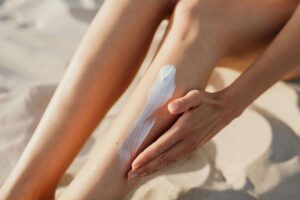Sun-Kissed Safely

As the sun’s warm embrace beckons us outdoors, it’s essential to ensure that we protect our skin from its harmful rays. While basking in the sun can impart a healthy glow, prolonged exposure without adequate protection can lead to sunburn, premature aging, and even skin cancer. In this blog, we’ll explore the importance of sun protection and introduce you to natural sunblock solutions that will allow you to embrace the sunshine safely, without compromising on your skin’s health or beauty.
Before delving into natural sunblock solutions, it’s crucial to understand why sun protection is essential for maintaining healthy skin. The sun emits ultraviolet (UV) radiation, consisting of UVA and UVB rays, which can penetrate the skin and cause damage at a cellular level. Overexposure to UV radiation can lead to sunburn, DNA damage, and an increased risk of skin cancer. Additionally, UV radiation can contribute to premature aging, causing wrinkles, fine lines, and hyperpigmentation.
The Problem with Conventional Sunscreens
While sunscreen is an essential tool in our sun protection arsenal, many conventional sunscreen formulations contain synthetic chemicals that can be harmful to both our bodies and the environment. Ingredients such as oxybenzone, octinoxate, and avobenzone have been linked to hormone disruption, skin irritation, and coral reef damage. Moreover, some chemical sunscreens can be absorbed into the bloodstream, raising concerns about their long-term safety.
Natural Sunblock Solutions
Harnessing the Power of Nature Fortunately, there are natural alternatives to conventional sunscreens that offer effective sun protection without the use of harmful chemicals. These natural sunblock solutions rely on mineral-based ingredients such as zinc oxide and titanium dioxide to create a physical barrier that reflects and scatters UV rays away from the skin. Unlike chemical sunscreens, mineral sunscreens sit on the surface of the skin and provide immediate protection upon application, making them a safe and reliable choice for sun protection.
Benefits of Natural Sunblock
Natural sunblock offers a host of benefits for both your skin and the environment. Mineral-based sunscreens provide broad-spectrum protection against both UVA and UVB rays, ensuring comprehensive coverage. Additionally, mineral sunscreens are less likely to cause skin irritation or allergic reactions, making them suitable for sensitive skin types. Furthermore, mineral sunscreens are reef-safe and biodegradable, minimizing their impact on marine ecosystems.
Choosing the Right Natural Sunblock
When selecting a natural sunblock, it’s essential to consider factors such as SPF (sun protection factor), water resistance, and application method. Look for sunscreens with an SPF of 30 or higher to ensure adequate protection against UV radiation. Opt for water-resistant formulations if you’ll be swimming or sweating, and remember to reapply sunscreen every two hours, or more frequently if you’re engaging in water-based activities.
Natural Sunblock Solutions to Try
Badger Sport Sunscreen SPF 35: This natural sunscreen is formulated with non-nano zinc oxide and organic ingredients such as sunflower oil, beeswax, and vitamin E. It offers broad-spectrum protection and is water-resistant for up to 80 minutes, making it ideal for outdoor activities.
Thinksport Safe Sunscreen SPF 50+: This mineral sunscreen provides high SPF protection using non-nano zinc oxide. It’s free from harmful chemicals and is water-resistant for up to 80 minutes. The formula is reef-safe and suitable for sensitive skin.
Alba Botanica Sensitive Mineral Sunscreen SPF 30: This gentle sunscreen is formulated with zinc oxide and botanical extracts like chamomile and aloe vera. It provides broad-spectrum protection and is fragrance-free, making it suitable for sensitive skin.

Tips for Sun Protection Beyond Sunscreen
While sunscreen is an essential part of sun protection, it’s not the only tool in your arsenal. Remember to seek shade during peak sun hours, typically between 10 a.m. and 4 p.m., and wear protective clothing such as hats, sunglasses, and lightweight, long-sleeved shirts. Additionally, consider incorporating antioxidant-rich foods into your diet, such as berries, leafy greens, and nuts, to help protect your skin from UV damage from the inside out.
With the right sun protection strategies in place, you can embrace the sunshine safely and enjoy all the benefits of outdoor activities without compromising your skin’s health or beauty. By choosing natural sunblock solutions that harness the power of nature, you can protect yourself from harmful UV radiation while minimizing your environmental impact. So, next time you head outdoors, don’t forget to lather up with natural sunscreen and bask in the sun’s warm embrace responsibly. Your skin will thank you for it.




